2022 Penn Summer Camps and Programs
Penn has a variety of activities available for young children and students of every age this summer. Due to the rapidly changing nature of the COVID-19 pandemic, many camps may undergo a change of dates or venue. Check the URLs provided in each listing for updated information. Information about additional camps and programs will be provided as it becomes available.
Enrichment & Education
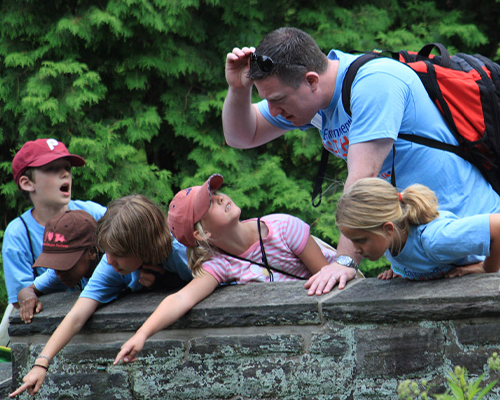
Morris Arboretum Summer Adventure Camps. Awaken the mind, nurture the spirit, and energize the body of your child! Led by experienced educators, we inspire new generations of citizen scientists by tapping into their natural curiosity about the world around them. Little Lightning Bugs is open for children aged 4-5. Bloomfield Buddies is open to children aged 6-11. Fees and to apply: https://morrisarb.org/camp. Early bird pricing ends February 15; regular pricing begins February 16.
Little Lightning Bugs 2022
July 5-8: Little Explorers.
July 11-15: Nuts About Nature.
July 18-22: Flying Friends.
July 25-29: Legends and Lore.
August 1-5: Bee Great.
August 8-12: Nature Jams.
Bloomfield Buddies 2022
July 5-8: Into the Wild.
July 11-15: Great Garden Adventure.
July 18-22: Brilliant Birds.
July 25-29: Wild Wizardry.
August 1-5: Insect Detectives.
August 8-12: Art at the Arboretum.
Penn Museum Anthropology Camp. Celebrate summer fun and learning through the Penn Museum’s world-renowned collections. Each week features an exciting theme with hands-on workshops, expert talks, gallery exploration, and more. Open to children aged 6-13 who are entering grades 1-8. Information and to apply: https://www.penn.museum/events/kids-family/summer-camp.
Penn Museum Camp Themes 2022
June 27-July 1: Stories from the Earth.
July 5-8: Building Bridges, Pyramids, and Temples.
July 11-15: Who’s Who in Ancient Egypt.
July 18-22: Signs and Superstitions.
July 25-29: Beats, Ballads, and Bards.
August 1-5: Powerful People: Kings, Queens, Pharaohs, and Shamans.
August 8-12: Stories from the Earth.
August 15-19: Building Bridges, Pyramids, and Temples.
Academics
Penn Carey Law School Pre-College Academy. Residential Session: July 10-30. Commuter Session: July 11-29. Ready for a focused summer experience at one of America’s oldest and most selective law schools? Join the Pre-College Law Academy at the #7 ranked Penn Law School at the University of Pennsylvania. Connect with our internationally renowned faculty through full-day intensives. Experience an accelerated version of the first-year law school curriculum at an Ivy-League university. Students learn from renowned faculty and thought leaders about cutting-edge legal issues. Open to students entering grades 10-12. Fees and to apply: https://www.summerdiscovery.com/penn-law#campusDatesRates. Deadline: TBA.
Penn Medicine Summer Program. June 26-July 23, 2022. Spend four weeks experiencing the University of Pennsylvania’s Perelman School of Medicine intensive summer program designed for high school juniors and seniors interested in medical careers. Modeled after actual first-year Penn medical school classes, you’ll gain exposure to the basics of medical training including practical experiences, simulations, and live demonstrations. Plus, you’ll live the life of a college student on Penn’s campus, located in University City in Philadelphia, PA. Open to students entering grades 11-12. Fees and to apply: https://campscui.active.com/orgs/BoldSummers#/selectSessions/3065444. Deadline: March 1.
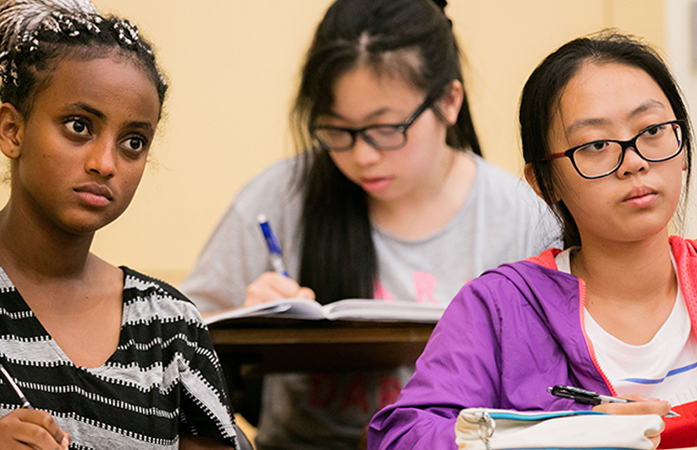
Penn Summer High School Programs. Penn offers academically talented high school students seeking a pre-collegiate experience the opportunity to challenge themselves with a rigorous Ivy League curriculum. Students engage with leading faculty and build intellectual connections within accelerated two-, three-, or six-week Penn Summer High School Programs. Info: https://summer.sas.upenn.edu/programs/high-school.
Penn Summer Prep Program. Session A: July 4-16. Session B: July 18-30. This two-week program offers non-credit, immersive study in disciplines across the sciences, arts, and humanities. Students choose two modules to focus their studies as they experience college life on Penn’s historic campus and explore the vibrant city of Philadelphia. Open to students entering grades 10-12. Info: hs.sas.upenn.edu/summer-programs/summer-prep.
Penn Summer Academies. July 10-30. Subject intensive programs fusing scientific or social theory with relevant application. Select from American Sign Language, biomedical research, chemistry research, experimental physics research, global culture and communication, mathematics, neuroscience research, and social justice research. Open to students entering grades 10-12. Info: hs.sas.upenn.edu/summer-programs/academies.
Pre-College Program. June 28-August 6. For the full undergraduate residential experience, the Pre-College Program allows high school students to live, dine, and study on campus as they take six-week, for-credit courses alongside Penn undergraduates. Open to students entering grades 11-12. Info: hs.sas.upenn.edu/summer-programs/pre-college-program.
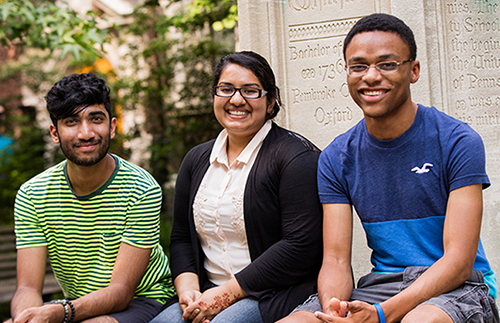
Penn Summer Global Institute. June 28-August 6. Comprehensive for-credit academic experience from the School for Arts and Sciences for top international undergraduates from around the world with high English language proficiency. Students have the option to enroll in an on-campus or online version of the program for summer 2022. Fees and to apply: summer.sas.upenn.edu/programs/international-students/psgi. Deadline: April 1.
Penn Summer Science Initiative (PSSI). July 5-28. Penn offers a free, four-week summer program for local high school students interested in materials science and engineering. Students will attend lectures in materials, a computer lab, experimental labs, and field trips to industrial and Penn facilities. Open to students entering the 11th-12th grade. Fees and to apply: https://www.lrsm.upenn.edu/outreach/pssi/. Deadline: March 1.
Penn Summer Sessions. 11-Week Session: May 23-August 5. Session I: May 23-June 29. Session II: June 30-August 5. Penn Summer Sessions offers undergraduate classes in the School of Arts and Sciences, the School of Engineering and Applied Science, the Weitzman School of Design, Penn Law, and the Wharton School—daytime, evening, and online. Open to all Penn undergraduates and visiting undergraduates. Fees (program-specific) and to apply: https://summer.sas.upenn.edu/programs/penn-summer-sessions. Deadlines: May 1 for 11-Week Session and Session I; June 17 for Session II.
Penn Vet Canine Handler Academy. Sessions 1: July 11-15. Session 2: July 18-22. Advanced Session: July 25-29. Students will gain hands-on training experience, learn from guest presentations, and enjoy various working dog demonstrations. Open to students entering 7th-9th grade. Info: https://www.vet.upenn.edu/research/centers-laboratories/center/penn-vet-working-dog-center/learn-about-working-dogs/canine-handler-academy. Deadline: TBA.
Summer Workshop for Young Writers at the Kelly Writers House. July 10-22. The Kelly Writers House offers an intensive workshop for students who show promise and a passion for writing. Instruction is at the undergraduate level, with an emphasis on creative nonfiction writing, supplemented by sessions in poetry, fiction, and other genres. Open to students entering the 11th-12th grade. Financial aid available. Fees and to apply: http://writing.upenn.edu/wh/summer. Deadline: mid-March.
Wharton Summer High School Programs. The Wharton School offers immersive experiences for high school students. Led by renowned faculty and instructional staff, programs explore topics that align with Wharton’s research and teaching. Pre-collegiate students engage with our rigorous business education before making a post-secondary choice and get the chance to study and network with global peers. Open to students entering the 10th-12th grade. Fees and to register: https://globalyouth.wharton.upenn.edu/summer-high-school-programs/.
Essentials of Entrepreneurship. Session 1: June 5-18. Session 2: June 19-July 2. Session 3: July 10-23. Session 4: July 24-August 6. With a two-week schedule filled with lectures, recitations, and activities, students will walk away with a better understanding of how to design a creative and useful product from scratch and what it takes to truly be an entrepreneur. Final deadline: April 7.
Essentials of Finance. Session 1: June 5-18. Session 2: June 19-July 2. Session 3: July 10-23. Session 4: July 24-August 6. Essentials of Finance provides an introduction to the theory, the methods, and the concerns of the world of finance. Learn about the fundamentals of both personal and corporate finance. Delve into the topics such as the time value of money, the trade-off between risk and return, equities, and corporate accounting. Final deadline: April 7.
Leadership in the Business World. Session 1: June 5-25. Session 2: June 26-July 16. Session 3: July 17-August 6. Designed to provide students with a glimpse of Wharton’s undergraduate curriculum, LBW offers opportunities to learn about leadership in 21st-century organizations through a dynamic and rigorous mix of classes with Wharton professors and business leaders, real-time business simulations, and team-building activities. Final deadline: April 7.
Data Science. July 10-30. Penn brings state-of-the-art machine learning and data science tools to high school students. We aim to stimulate curiosity in the fast-moving field of machine learning through this rigorous yet approachable program. The primary theme throughout the program will be building up statistical foundations together with empirical analysis and critical thinking skills. Final deadline: April 7.
Moneyball Academy. July 10-30. Moneyball Academy is a three-week summer program that provides an opportunity to study sports analytics at the Wharton School. This program focuses on using data to make deep discoveries in sports while becoming a data-driven decision-maker. Instruction will focus on fundamentals of statistical thinking, real applications employed by statistics professionals in sports analytics, and an introduction to statistical programming languages. Final deadline: April 7.
Sports Business Academy. July 10-30. Examines various academic disciplines as they apply to the sports industry with an overview of the business and legal aspects of various intercollegiate, Olympic, and professional sports enterprises. Students ultimately gain insight into the leadership, management, and increasingly global nature of the sports business. Through academic and co-curricular activities, WSBA students have the opportunity to test their potential as future sports business leaders. Final deadline: April 7.
Management & Technology Summer Institute. July 10-30. A rigorous and rewarding for-credit summer program for rising high school seniors and a select number of rising high school juniors interested in exploring the integration of technological concepts and management principles. Final deadline: April 1.
Future of the Business World. Online. Session 1: June 6-17. Session 2: June 20-July 1. Session 3: July 11-22. Session 4: July 25-August 5. A dynamic learning experience for exceptional high school students from around the world. It is designed to introduce students to areas of research by Wharton faculty and engage them as the next generation of global business leaders. Students attend live daily online events and work independently. Priority deadline: March 15. Final deadline: May 5.
Essentials of Leadership. Online. Session 1: June 6-17. Session 2: June 20-July 1. Session 3: July 11-22. Session 4: July 25-August 5. An intensive, two-week summer opportunity for a select group of rising high school sophomores, juniors, and seniors seeking an introduction to outstanding undergraduate business education. Participants will develop leadership, teamwork, and communication skills, while learning from and collaborating with Wharton faculty, guest speakers, and other talented high school students from around the world. Priority deadline: March 15. Final deadline: May 5.
Understanding Your Money. Online. Dates TBA. A self-paced online program for high school students. Offering an introduction to fundamental economic concepts, including investing and basic money management skills, this program is designed to help students make smarter financial decisions. In addition to online video lessons delivered by Wharton faculty, the program also includes related readings, activities, glossary terms, and quizzes to test learning. Deadlines: TBA.
Moneyball Academy: Training Camp. Online. Session 1: June 27-July 1. Session 2: July 25-29. Moneyball Academy: Training Camp offers a one-week introduction to statistics and coding. By the end of the program, students will better understand sports analyses in articles, and will create their own sports analysis project. Students will also learn the basics of how to read and write code in R, the advanced statistical programming language used by professional statisticians. Priority deadline: March 15. Final deadline: May 5.
Athletics
Campus Recreation Adventure Camp. Session 1: July 11-15. Session 2: July 18-22. Session 3: July 25-29. Engages with the West Philadelphia and Penn Community to provide a safe and fun-filled sport and recreation experience that will ensure lifelong memories. Open to children aged 6-12. Info: https://pennreccamps.com/. Early bird deadline: today, February 15. Final deadline: TBA.
John Yurkow Baseball Camp. Session 1: June 20-23. Session 2: July 18-21. Session 3: August 8-11. Gives campers the opportunity to compete, learn and improve their game with a high level of instruction. Athletes will receive an understanding of the game in a fun and exciting environment and a great experience in college baseball. Open to students entering grades 9-12. Info: www.pennbaseballcamp.com. Deadline: TBA.
Steve Donahue’s Quaker Basketball Camps. June 11-12, June 28-30, August 15-17. Spend a day with Penn staff receiving quality individual instruction and learning what it takes to compete at the Division 1 level. Sessions will include skill development, 3v3, and full court competition. Open to boys entering grades 9-12. Info: https://pennbasketballcamp.com/mensbball/camp-elite.php. Deadline: June 1.
Wilson Collegiate Tennis Camp. Weekly sessions from June 13 to September 2. The Wilson Collegiate Tennis Camps is the nation’s most popular tennis camp. Hosting close to a thousand campers each summer, the camp has built a reputation for top-flight instruction, fun and well-organized days. Open to boys and girls, aged 5-18. Info: https://www.wilsontenniscamps.com/penn/. Deadlines: Vary by session.
To view a PDF of the supplement, click here.

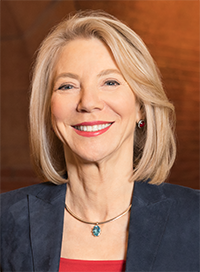 Amy Gutmann’s lifelong dedication to the transformative power of education is captured in a favorite riddle. “What’s the difference between a scrap metal dealer and an Ivy League university president?” she’ll sometimes ask an audience. Her answer comes straight from the heart: “One generation.”
Amy Gutmann’s lifelong dedication to the transformative power of education is captured in a favorite riddle. “What’s the difference between a scrap metal dealer and an Ivy League university president?” she’ll sometimes ask an audience. Her answer comes straight from the heart: “One generation.”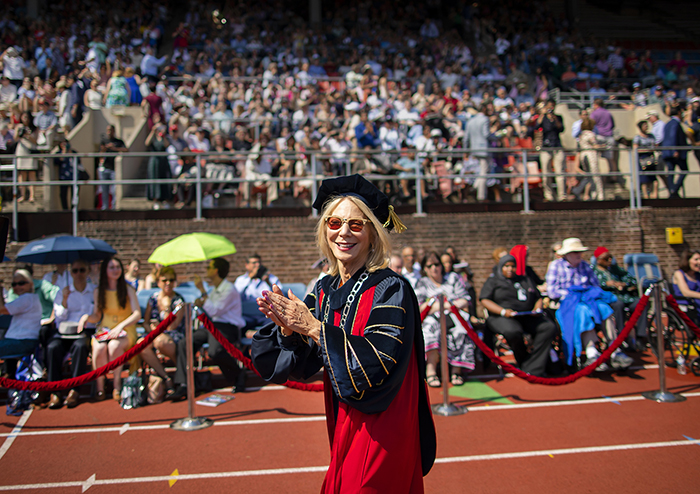 Today, nearly 80 percent of traditional undergraduates leave Penn debt-free and the lives of tens of thousands of students and their families have been transformed for the better. Pioneering initiatives such as Penn First Plus—a comprehensive support system for first-generation and low-income students—propel the success of all students. Applications for admission have grown exponentially in quantity and in every dimension of quality, with a record-breaking 56,333 applications to join the Class of 2025. Penn’s selectivity for the Class of 2005 was 21 percent; it is about 5.7 percent for the Class of 2025. The proportion of students in Penn’s entering class who are low-income, those who are first-generation, and those who identify as minorities all more than doubled over Dr. Gutmann’s presidency.
Today, nearly 80 percent of traditional undergraduates leave Penn debt-free and the lives of tens of thousands of students and their families have been transformed for the better. Pioneering initiatives such as Penn First Plus—a comprehensive support system for first-generation and low-income students—propel the success of all students. Applications for admission have grown exponentially in quantity and in every dimension of quality, with a record-breaking 56,333 applications to join the Class of 2025. Penn’s selectivity for the Class of 2005 was 21 percent; it is about 5.7 percent for the Class of 2025. The proportion of students in Penn’s entering class who are low-income, those who are first-generation, and those who identify as minorities all more than doubled over Dr. Gutmann’s presidency.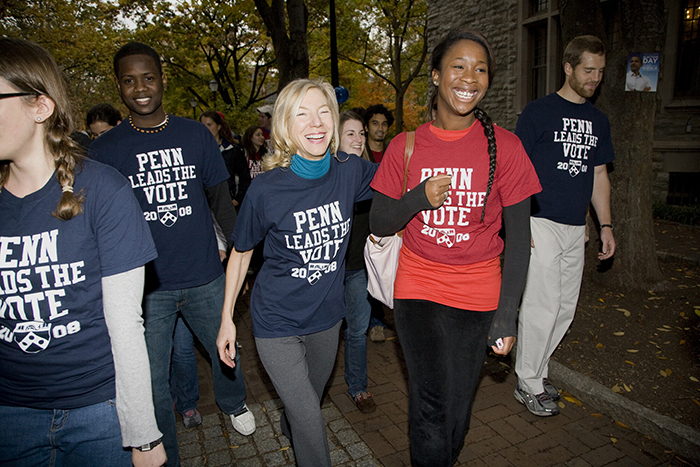
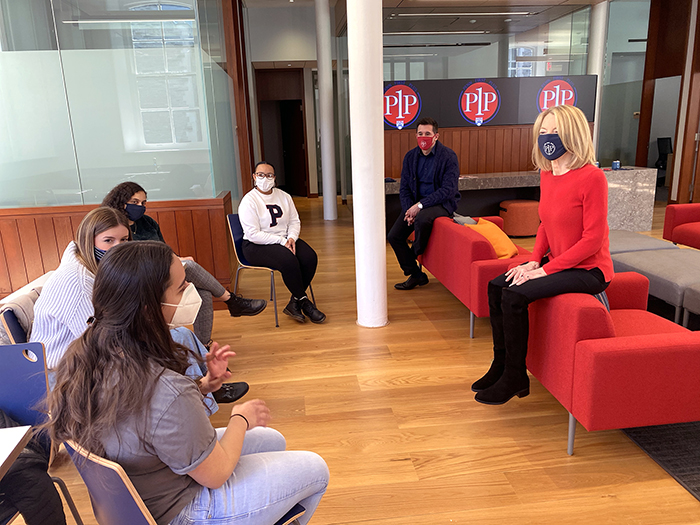
 The Penn Libraries is pleased to announce that Sean Quimby, associate university librarian and director of the Kislak Center for Special Collections, Rare Books and Manuscripts, has been appointed Director of the Schoenberg Institute for Manuscript Studies (SIMS).
The Penn Libraries is pleased to announce that Sean Quimby, associate university librarian and director of the Kislak Center for Special Collections, Rare Books and Manuscripts, has been appointed Director of the Schoenberg Institute for Manuscript Studies (SIMS). Amy C. Brodkey, M’75, an eminent psychiatrist, an advocate for women’s mental health services, and a former clinical associate professor of psychiatry in the Perelman School of Medicine, died on November 22, 2021, of heart failure. She was 72.
Amy C. Brodkey, M’75, an eminent psychiatrist, an advocate for women’s mental health services, and a former clinical associate professor of psychiatry in the Perelman School of Medicine, died on November 22, 2021, of heart failure. She was 72. 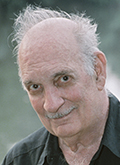 George Crumb, an influential American composer and the Annenberg Professor Emeritus of the Humanities in the department of music in the School of Arts and Sciences, passed away on February 6 at home in Media, PA. He was 90.
George Crumb, an influential American composer and the Annenberg Professor Emeritus of the Humanities in the department of music in the School of Arts and Sciences, passed away on February 6 at home in Media, PA. He was 90. 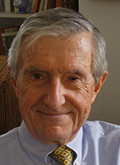 John J. “Jack” Downes, the anesthesiologist-in-chief and director of the department of anesthesiology and critical care medicine at the Children’s Hospital of Philadelphia from 1972 to 1996, passed away peacefully on December 17, 2021. He was 91.
John J. “Jack” Downes, the anesthesiologist-in-chief and director of the department of anesthesiology and critical care medicine at the Children’s Hospital of Philadelphia from 1972 to 1996, passed away peacefully on December 17, 2021. He was 91. 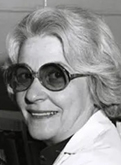
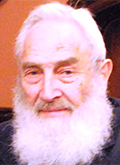 Samuel Zundel Klausner, an emeritus professor of sociology in the School of Arts and Sciences, passed away on December 27, 2021. He was 98.
Samuel Zundel Klausner, an emeritus professor of sociology in the School of Arts and Sciences, passed away on December 27, 2021. He was 98. 


